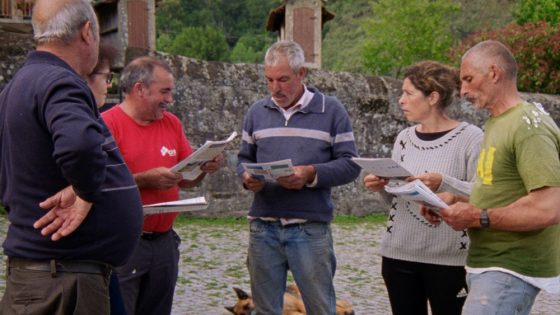Paulo Carneiro‘s third feature, “Savanna and the Mountain,” is world premiering at this year’s Cannes in the Director’s Fortnight section. The film depicts a David-and-Goliath struggle between rural folk from Covas de Barroso in the North of Portugal and London-based Savannah Resources, which plans to build Europe’s biggest open-air lithium mine.
The venture to carve out the local mountains in the search for lithium, first proposed around 2017, has been met with fierce resistance from local villages and councils. A corruption scandal associated with the fast-tracked approval process led to the downfall of the previous Socialist government, led by Antonio Costa, a recent general election that saw the center-right party PSD take power, and a surge in votes for the far-right party, Chega.
In 2019, ecologists and the community of the small village of Covas de Barroso, which faced the devastation of its agricultural properties, decided to contact Carneiro, whose father was born in a nearby village and who had recently directed the feature-length documentary “Bostofrio” in the same area.
The villagers offered to star in the film as non-professional actors to raise awareness of their struggle to combat the mining project.
“A lot of people have been writing about the struggle against this lithium mining project, including several doctoral theses, and we suddenly realized that it might be good for them to have some film content,” explains Carneiro. “So I began by making some videos, including interviews, protests and songs. Nobody in the cities, even in Portugal, knows what’s going on in Barroso, which is a huge project. I suddenly realized I could make a difference.”
The local council of Boticas offered Carneiro a small grant for the project, and he began a staggered filming process that took almost three years to complete.
Carneiro decided to film on Super 16 and received discounts from Kodak and London’s Cinelab, which made this a viable option.
The director first met his coproducer, Alex Piperno, at the Uruguay International Film Festival in 2019, and they both subsequently attended Berlinale Talents. They agreed to co-write the screenplay, and the project was structured as a Portuguese-Uruguay co-production between Bam Bam Cinema and La Pobladora Cine. They secured funding from Uruguay’s Film and TV Agency, ACAU and Uruguay Audiovisual.
“Film agencies are increasingly orientated towards projects that will be successful in the festival circuit and/or theatrical and TV market, and the agency could see the potential of our project,” says Carneiro.
The film received the RTP award for Best First Cut at DocLisboa’s Arché Awards in 2022.
Carneiro says he was frustrated not to secure funding from Portugal’s Institute of Cinema and Audiovisual. “We presented the rough cut of the film in three successive years, but each time received a lower classification, and in the last call, we ended in almost last place,” he explains. “The jury members emphasized the potential of our film in festivals but said that it didn’t match their quality criteria. There’s another Portuguese film, Inês Lima’s short, ‘The Moving Garden’, which is also playing at Directors’ Fortnight, and like us, received a poor classification, but not as bad as ours. It’s really scary, but there you go.”
The characters in “Savanna” complain that the project will destroy the mountains and only serves to allow people from the North of Europe to drive their electric cars, saying: “The people of the North don’t care about us. Now it’s time to fight.”
The film’s closing credits refer to the fact that the local Barroso Agro-sylva-pastoral System is classified as a Globally Important Agricultural Heritage System by the UN’s Food and Agriculture Organization. It is one of only ten sites with this classification in Europe.
Savanna and the Mountain
The local protests emphasized that the ministers in charge of the licensing process, particularly the former Infrastructures Minister João Galamba, were acting like cowboys and turning their homeland into a Wild West.
For Carnival 2022, the villagers chose a Wild West theme and called it “The Lithium Mafia.” Carneiro includes footage from this protest in the film.
“We see the locals portrayed as Indians fighting the Cowboy invaders, but ultimately, we see that they are all locals, all indigenous because the company Savannah is also hiring locals to do the work. Ultimately, this isn’t a black-and-white issue. I’m interested in the gray areas.”
The Western theme is reflected in the lettering used in the film’s titles, the use of music and guns and a final scene in which one of the main characters gallops towards us on a white horse with the sound of fireworks resounding in the distance. The message is clear – if Savannah advances with the project, there will be blood.
Alongside the Wild West theme, the film also channels Portugal’s legacy of the 1974 revolution – whose 50th anniversary is celebrated this year – and the period of colonial wars that were ended by the revolution. The inclusion of protest songs and the desire of the local community together to fight off the invaders is imbued with warlike determination and revolutionary zeal.
Carneiro explains that he began writing the screenplay with the opening and ending scenes – in which we see a farmer, played by Carlos Libo, who also composed and performed songs in the film, trying to calm down a nervous white horse at the beginning and ride in protest on the same horse at the end.
“When I’m writing a film, I tend to think about the opening and end scenes, and then I go to the middle,” he explains. “That’s one reason why we call our production company Bam Bam Cinema – the beginning and end of the film have to be very strong.”
The pic combines fiction with a documentary style, with slow pacing and static shots that build up the tension until the final scene.
“I’m interested in a kind of cinema that is close to people in the sense that we can make a film with a few people, almost as a joint effort,” says Carneiro. “The camera style is linked to the question of the body. The shots allow me to create a sense of movement within the overall framing, a kind of ballet. I don’t move the camera for the sake of moving it. There has to be a reason; for example, to follow a character’s movements.”
Carneiro runs Bam Bam Cinema with Miguel de Jesus, who lives in Australia. In January 2024, de Jesus’s short film “On Plains of Larger River & Woodlands” screened at Rotterdam.
Carneiro hopes to transform the Cannes screening into an event that will shine a spotlight on the plight of the rural people living in the Barroso region. He has invited the local mayor and several cast members to attend the world premiere on Saturday, May 18.
“I think it’s a bit megalomaniac to believe that a film can change the world, but at the same time, in a small way, I think it can make a difference,” he says.
Source Agencies




